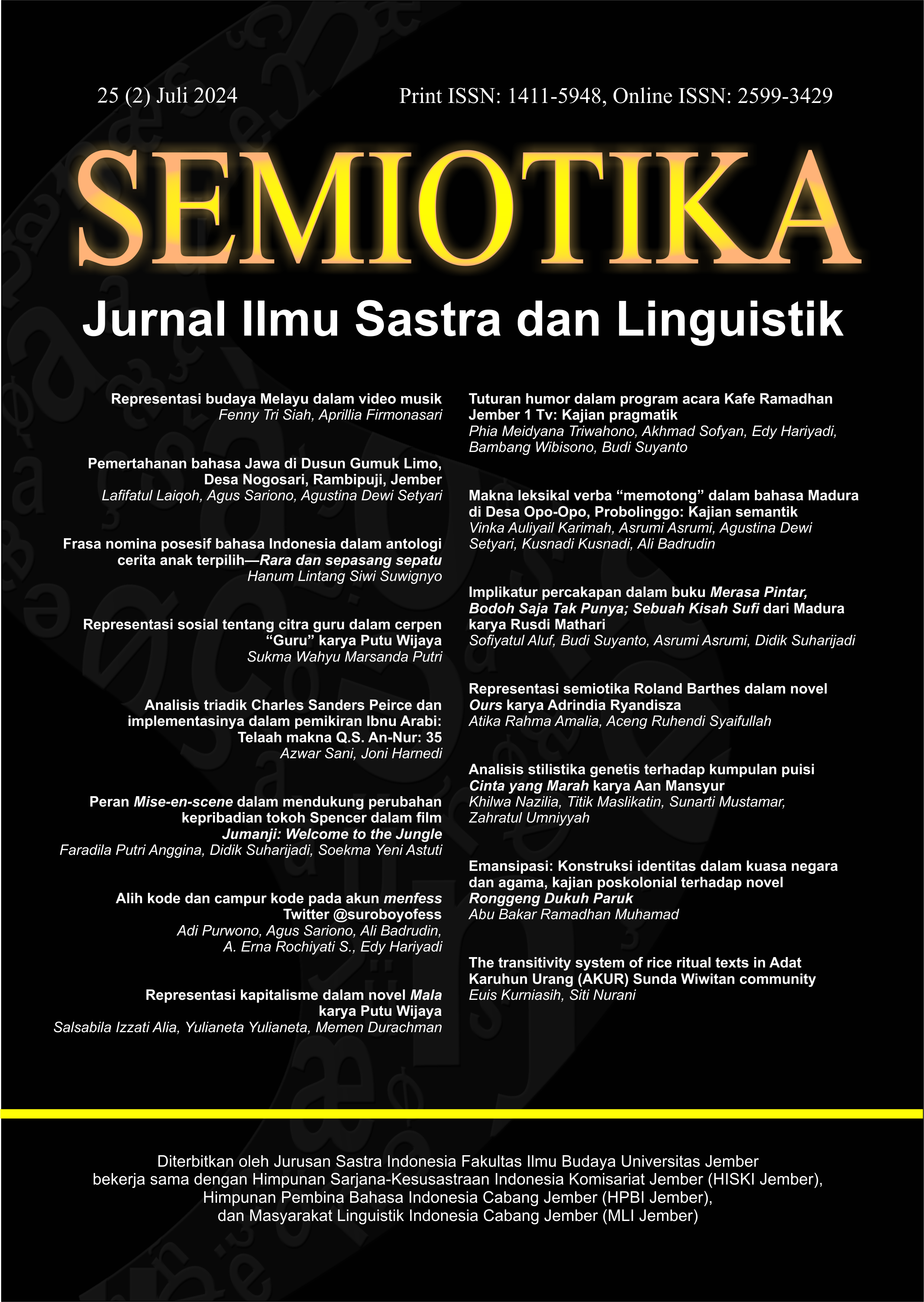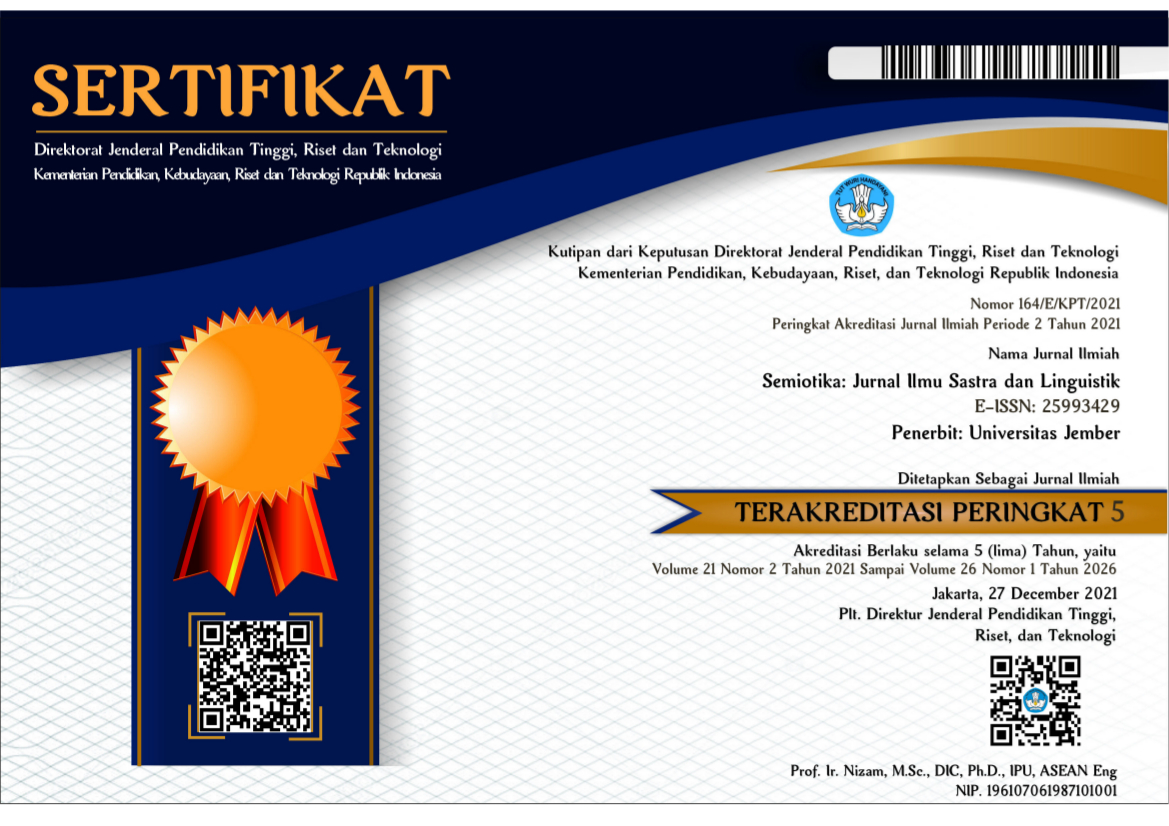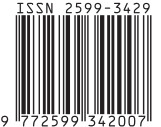Implikatur percakapan dalam buku Merasa Pintar, Bodoh Saja Tak Punya; Sebuah Kisah Sufi dari Madura karya Rusdi Mathari
Abstract
The book Merasa Pintar, Bodoh Saja Tak Punya has a religious genre that touches on the principal matters of a Muslim. The speech between the characters in the book depicts different levels of thinking and is difficult for ordinary people to understand. This research aims to describe forms of speech that contain specific Sufistic conversational implicatures and to describe forms of speech that contain general conversational implicatures in the book. This study used a descriptive qualitative method. The results of this research show that the implicatures found contain implicit meaning in the form of assertive, directive, expressive, and declarative speech. These implicatures arise because there is a violation of the principles of cooperation in the form of the principles of cooperation in quantity, quality, relationship, and method. The speech between the characters implies the sophistication of the Sufi character which consists of three levels, namely the level of sharia, tarekat, and essence. The implicatures found contain religious advice. The speech is conveyed implicitly in order to provide advice and criticism that can be accepted by other characters.
References
Azizah, K., & Lakson, K. 2022. “Implikatur dalam Podcast Deddy Corbuzier Bersama Retno Marsudi di Media Sosial Youtube: Kajian Pragmatik”. BAPALA. 9(8):146-157.
Chaer, A., & Leonie, A. (2010). Sosiolinguistik: Perkenalan Awal. Jakarta: PT Rineka Cipta.
Leech, G. 1993. Prinsip-Prinsip Pragmatik. Jakarta: Penerbit Universitas Indonesia (UI-Press).
Lubis, H. (1993). Analisis wacana pragmatik. Bandung: Penerbit Angkasa.
Moleong, L. J. 2010. Metodologi Penelitian Kualitatif. Bandung: Remaja Rosdakarya.
Putri, Y.H, dkk. 2021. “Analisis Deiksis dalam Novel ‘Merasa Pintar Bodoh Saja Tak Punya’ Karya Rusdi Mathari”. Widyabastra, 9(2):33-40.
Rahayu, S.E. 2020. “Islam Sempurna dalam Konsep Syariat, Tarekat, dan Hakikat”. Jurnal Emanasi, Jurnal Ilmu Keislaman dan Sosial, 3(1):1-8.
Rani, A., Arifin, B., Martutik. 2006. Analisis Wacana: Sebuah Kajian Bahasa dalam Pemakaian. Malang: Bayumedia Publishing.
Sudaryanto. 1993. Metode dan Aneka Teknik Analisis Bahasa Pengantar penelitian Wahana Kebudayaan dan Linguistis. Yogyakarta: Duta Wahana University Press.
Sudaryat, Y. 2009. Makna dalama Wacana: Prinsip-Prinsip Semantik dan Pragmatik. Bandung: Yrama Widya.
Yule, G. 1996. Pragmatic. Oxford University Press. Terj. Wahyuni, Indah Fajar. 2014. Pragmatik. Yogyakarta: Penerbit Pustaka Belajar.
Zamzami. 2007. Kajian Sosiopragmatik. Yogyakarta: Cipta Pustaka.

This work is licensed under a Creative Commons Attribution-ShareAlike 4.0 International License.
SEMIOTIKA has CC-BY-SA or an equivalent license as the optimal license for the publication, distribution, use, and reuse of scholarly work. Authors who publish with this journal retain copyright and grant the journal right of first publication with the work simultaneously licensed under a Creative Commons Attribution-ShareAlike 4.0 International License that allows others to share the work with an acknowledgment of the work's authorship and initial publication in this journal.
Attribution-ShareAlike
CC BY-SA










